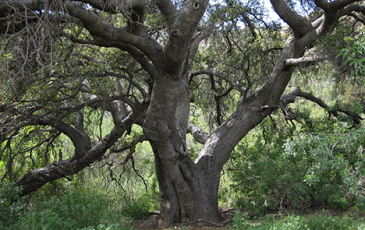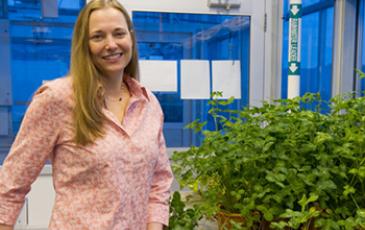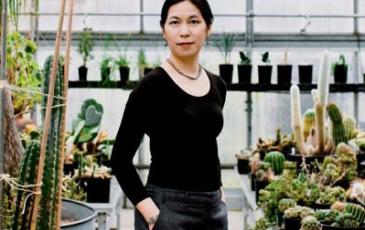The Montgomery Lab pursues a common research theme of understanding how individuals perceive, respond to, and are impacted by the environments in which they exist. Primary research efforts of the group are focused on the responses of photosynthetic organisms to external light cues. Additionally, Montgomery pursues this theme in the context of effective mentoring in research environments.
Past PMB Seminars
For a schedule of all Plant & Microbial Biology events, seminars, and lectures visit our calendar.
Robert Skelton: Science Cafe - Beyond the wilting point
California is likely to experience increased frequency of drought events as a consequence of global climate change. A tremendous challenge for plant ecologists is to understand how plant communities, such as the ecologically and culturally important Californian oak woodlands, are likely to respond to drought. Part of the solution to this challenge lies with understanding the plumbing system – the...
Kari Segraves: Cheating, community context, and coevolution in the yucca-yucca moth mutualism
Understanding biodiversity requires more than identifying the number of species on earth. We must also elucidate how species interactions govern the dynamics of communities, ecosystems, and species diversity. My lab uses a broad combination of approaches including experimental ecology, field observations, molecular phylogenetics, and population genetics to understand the role that interspecific...
Keiko Torii: Breaking the Silence - Chemical and Synthetic Approaches for Plant Developmental Biology
The Torii lab studies how plant cells coordinate proliferation and differentiation during organ morphogenesis to generate beautiful, orderly patterns. We aim to understand the molecular and genetic bases of cell-cell communication that specifies organ size, shape, and stomatal patterning through integrated approaches.
David Pride: Role of viruses in the microbiome
Our laboratory focuses on the role that microbial communities play in human homeostasis, health and disease. We firmly believe that the various microbial components of human ecosystems including bacteria, viruses, archaea, and fungi are important factors that help determine the natural history of their hosts. Furthermore, their interactions with humans or their interactions with other microbial...
Derek Walsh: Mimicry of plant ribosomes and translational control mechanisms by mammalian poxviruses
Research in our laboratory focuses on two aspects of DNA virus biology: 1) The role of the host translation system during infection by poxviruses. 2) Microtubule regulation and function during herpes simplex virus infection.
Yannick Jacob: Regulation of Chromatin Replication by Histone Variants
We study epigenetics using plants as model systems. Our goals are to understand how the epigenome contributes to basic cellular mechanisms like DNA replication and gene silencing, and also complex processes like developmental transitions, trans-generational inheritance and aging. We are also interested in exploring how the epigenome can be modulated to improve current genome engineering...
Center for Computational Biology Seminar
Integrating Information from Diverse Microscope Images: Learning and Using Generative Models of Cell Organization
Moriah Szpara: Taking stock: the impacts of genetic diversity for herpes simplex virus (HSV)
A variety of viruses infect the human nervous system, often with severe consequences. While vaccines have largely defeated the paralysis caused by polio, other viruses such as rabies, West Nile virus, and herpes simplex virus (HSV) continue to cause neurological infections that require clinical intervention. More than 70% of adults in the United States carry HSV, whether they know it or not. HSV...











